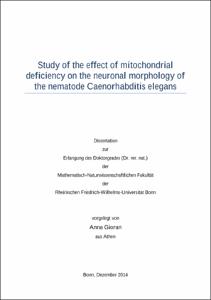Gioran, Anna: Study of the effect of mitochondrial deficiency on the neuronal morphology of the nematode Caenorhabditis elegans. - Bonn, 2015. - Dissertation, Rheinische Friedrich-Wilhelms-Universität Bonn.
Online-Ausgabe in bonndoc: https://nbn-resolving.org/urn:nbn:de:hbz:5n-40432
Online-Ausgabe in bonndoc: https://nbn-resolving.org/urn:nbn:de:hbz:5n-40432
@phdthesis{handle:20.500.11811/6488,
urn: https://nbn-resolving.org/urn:nbn:de:hbz:5n-40432,
author = {{Anna Gioran}},
title = {Study of the effect of mitochondrial deficiency on the neuronal morphology of the nematode Caenorhabditis elegans},
school = {Rheinische Friedrich-Wilhelms-Universität Bonn},
year = 2015,
month = jul,
note = {Neurons are highly polarized cells that constantly undergo remodeling of their branches during and after their development. This energy demanding process depends on energy provision from mitochondria via the oxidative phosphorylation (OXPHOS). Although the molecular mechanisms connecting the two are important for understanding pathologies linked to defective neuronal branching due to mitochondrial deficiency, they still remain elusive. In this study, we approached this problem by using as a model a highly branched sensory neuron in Caenorhabditis elegans which demonstrates altered branching pattern in conditions of mitochondrial deficiency. In particular, we show that animals carrying mutations in genes encoding mitochondrial complex I subunits have more dendrites on their sensory neurons compared to wild type animals. The increased outgrowth is not a cell type-specific phenomenon since other types of sensory neurons demonstrate ectopic structures due to complex I deficiency, as well. Importantly, the increased branching is not a result of oxidative stress, but it is regulated by a distinct signaling cascade. Specifically, activation of AMP-activated protein kinase AMPK due to mitochondrial deficiency is one of the regulatory events and we show that its downstream target phosphoinositide 3-kinase PI3K participates in the same pathway. Finally, we demonstrated that the increased neuronal arborizations displayed by OXPHOS mutants are independent of their longevity. Overall, our findings reveal a signaling pathway which regulates tightly dendritic branching in conditions of mitochondrial deficiency and contribute to the understanding of more complicated phenomena occurring in relevant neurodegenerative diseases.},
url = {https://hdl.handle.net/20.500.11811/6488}
}
urn: https://nbn-resolving.org/urn:nbn:de:hbz:5n-40432,
author = {{Anna Gioran}},
title = {Study of the effect of mitochondrial deficiency on the neuronal morphology of the nematode Caenorhabditis elegans},
school = {Rheinische Friedrich-Wilhelms-Universität Bonn},
year = 2015,
month = jul,
note = {Neurons are highly polarized cells that constantly undergo remodeling of their branches during and after their development. This energy demanding process depends on energy provision from mitochondria via the oxidative phosphorylation (OXPHOS). Although the molecular mechanisms connecting the two are important for understanding pathologies linked to defective neuronal branching due to mitochondrial deficiency, they still remain elusive. In this study, we approached this problem by using as a model a highly branched sensory neuron in Caenorhabditis elegans which demonstrates altered branching pattern in conditions of mitochondrial deficiency. In particular, we show that animals carrying mutations in genes encoding mitochondrial complex I subunits have more dendrites on their sensory neurons compared to wild type animals. The increased outgrowth is not a cell type-specific phenomenon since other types of sensory neurons demonstrate ectopic structures due to complex I deficiency, as well. Importantly, the increased branching is not a result of oxidative stress, but it is regulated by a distinct signaling cascade. Specifically, activation of AMP-activated protein kinase AMPK due to mitochondrial deficiency is one of the regulatory events and we show that its downstream target phosphoinositide 3-kinase PI3K participates in the same pathway. Finally, we demonstrated that the increased neuronal arborizations displayed by OXPHOS mutants are independent of their longevity. Overall, our findings reveal a signaling pathway which regulates tightly dendritic branching in conditions of mitochondrial deficiency and contribute to the understanding of more complicated phenomena occurring in relevant neurodegenerative diseases.},
url = {https://hdl.handle.net/20.500.11811/6488}
}






